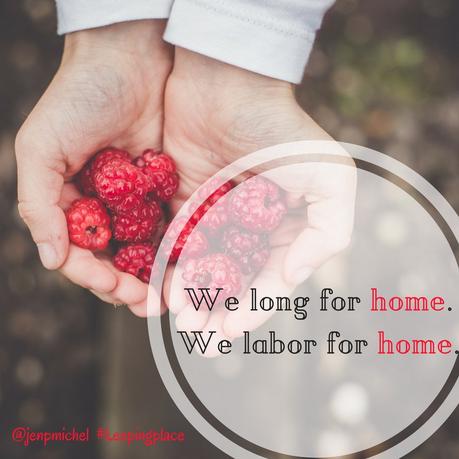
"Home is a human place. Instinctively, each of us, male and female, knows the sound of its welcome - and the joy of our possible return.
Readers - Today I am at A Life Overseas talking with Jen Pollock Michel about her newly released book Keeping Place - Reflections on the Meaning of Home. Will you join me there? I've given you a brief preview below!
This community knows the challenge of creating home in odd spaces and places around the globe. We also know what it is to be homesick, to long for familiar sights and sounds, to occasionally cry during the dark of night, reaching out to a God who created place.
In her newly released book, Keeping Place - Reflections on the Meaning of Home, Jen Pollock Michel writes about this human longing. The back cover eloquently conveys what the book extends to the reader:
"Keeping Place offers hope to the wanderer, help to the stranded,and a new vision of what it means to live today with our longings for eternal home."
I had the privilege of reading an advance copy of Keeping Place. Throughout my reading, I thought about my upbringing, as well as the many moves I have made in my adult life. I also thought about this community and the ways we leave one home and create a new one, always aware that in home and place, the temporal and the eternal meet.
I asked Jen if she would meet with our community here at A Life Overseas and talk about the book - which really means have a conversation about home and place.
I hope you enjoy the conversation as much as I did!
Interview with Jen Pollock Michel
Can you give us a sense of how you came to write a book about place and home?I feel like I've spent my entire life searching for home. This is partially because we were a very typically mobile American family during my childhood: my dad chased the tail of opportunity, and we moved for those opportunities. And although I wanted to give a more rooted life to my own children, we've also moved a lot for my husband's career, including a move to Canada six years ago.
But it's not just mobility that has left me longing for home. I've also experienced a lot of loss in my life: the premature death of my father, the suicide of my brother, a sometimes emotionally distant relationship with my mother. It's these life experiences that springboard a Scriptural exploration throughout the book.
You currently live in Toronto, Canada - a place where you didn't grow up and a country where you don't legally hold citizenship. How has living where you are a guest shaped your view of home?It's now been six years that we've had no permanent immigration status in Canada, so I'm writing about home from the "stranger" perspective, for sure. In an ex-pat life, the longings for permanence and belonging are particularly acute, and it's easy, of course, to nostalgically think of the place we've left behind as the home that would settle those longings.
But truthfully, I've realized in writing the book that these longings aren't just characteristic of the ex-pat life. It's not as if we're the only ones to feel dislocation in this world. No, I think it's most true to say that exile is the human experience and has been since Genesis 3 when we left the Garden behind. This exile can be dislocation geographically, but it can also be estrangement in our relationships with others and most importantly, with God.
What truths (characteristics) of God did you learn through writing this book?Probably most importantly, I've begun to see God is as "homemaker." That word tends, for many Westerners, to connote a woman who abandons career to stay at home with her children, and this conception has given us a very narrow view of homemaking. But to look carefully at the arc of Scripture (which begins and ends at home) is to see a homemaking God. At the very beginning, Genesis 1 drives toward this idea that God is making a habitable world for his people. "It is good" is a way for God to say, "It is homelike. People can live here." And then of course in Revelation, we see God bringing heaven to earth and welcoming his children to dwell with him.
For me, a view of God's homemaking inspires a whole new affective quality to his work of redemption. It's not just that God has sent Jesus so that he can "acquit" sinners in a kind of impersonal legal transaction. It's that God has made His own Son a stranger for our sake.
Salvation isn't just pardon: it's welcome. It's homecoming. You can read the rest of the piece here
